How a Packaging Leak Tester Ensures Sterile Vial Integrity
How a Packaging Leak Tester Ensures Sterile Vial Integrity

Keeping pharmaceutical vials sterile and sealed is absolutely necessary when making injectable drugs. A damaged seal can cause contamination, make the medicine less effective, or even create life-threatening risks for patients. To lessen these dangers, drug makers depend on modern packaging leak testers. These machines are built to find any fault in how containers are sealed. This article will look at why vial integrity is so important, how leak testing works, and how the MFT Series from MedIntegrity gives smart solutions for pharma quality control.
Importance of Vial Integrity in Pharmaceutical Packaging
Keeping a vial properly sealed is very important for the drug’s sterility. Ultimately, it protects the patient.
Why Sterility Matters in Injectable Drug Products
Injectable medicines go right past many of the body’s natural defenses. This makes them especially at risk for microbial contamination. When producing injectable drugs, biological products, and eye drops, sterile filtration is key. Even a tiny break in a vial’s seal can let germs in. This can make the drug unsafe or useless.
Regulatory Requirements for Container Closure Integrity
Official groups around the world, like the FDA and USP, have set strict rules for testing. To follow these demanding rules, pharmaceutical factories use tools like filter integrity testers and TOC analyzers. They must comply with standards set by major regulators, including the US Food and Drug Administration (FDA), the European Medicines Agency (EMA), and the China Food and Drug Administration (CFDA). Following standards like USP <1207> and ASTM F2338 ensures that packaging systems are strong enough. In this way, they can keep the product sterile for its entire shelf life.
Risks Associated with Compromised Vial Seals
Leaks in vial seals can cause problems. For instance, they can lead to oxidation, contamination from microbes, or the product evaporating. This doesn’t just make the medicine weaker; it also creates serious health dangers. Besides that, product recalls from bad packaging can greatly harm a company’s reputation and its financial health.
Principles Behind Packaging Leak Testing
Leak detection technologies are made to spot tiny holes without ruining the product.
Overview of Non-Destructive Leak Testing Methods
Non-destructive methods are favored because the product sample can still be used afterward. Usual techniques include vacuum decay testing, pressure decay methods, high-voltage leak detection (HVLD), and using tracer gases like helium or CO₂ to find leaks. Each method is good for different things, depending on the container and how sensitive the test needs to be.
Vacuum Decay Method and Its Application in Vial Testing
The vacuum decay tester is a popular choice. It works by connecting to a test chamber. First, the package is placed inside, and then the air is pumped out. After that, vacuum sensors watch for any change in the vacuum level over a short time. Any change means there is a leak. This method is really successful for hard containers like vials because it can find even micro-leaks.
Key Parameters Measured During Leak Detection
During a leak test, several key things are watched. These include the rate of pressure change (ΔP/Δt), the final vacuum level reached, and how steady the vacuum holds. System noise levels are also monitored. All these factors help decide if a container passes its integrity check.
Features of Modern Packaging Leak Testers
Today’s leak testers do more than give a simple pass or fail. They offer complete features for quality control.
Sensitivity and Accuracy in Detecting Micro-Leaks
Modern tools can spot leaks as small as 5 microns. They are highly sensitive and can find the tiniest leaks. This makes them a favorite in industries that have very strict quality needs. High-resolution sensors also deliver dependable results without mistakes.
Data Logging, Audit Trails, and Compliance Capabilities
Modern systems help with GMP compliance. They have software that records test results on its own. What’s more, audit trails provide a clear history for every test, which is vital during inspections.
Compatibility with Various Container Types and Formats
Leak testers today are built for flexibility. They can handle all sorts of containers. For example, they can test vials, ampoules, syringes, blister packs, and infusion bags by using different attachments or custom-made chambers.
MedIntegrity’s MFT Series: Advanced Solutions for Leak Detection
MedIntegrity’s MFT series is the latest technology. It is made just for pharmaceutical packaging leak testing.
MFT-600: Semi-Automatic Tester for Small Batch Testing

This is a great choice for R&D labs or smaller production runs.
- Key Specifications and Performance Metrics:The MFT-600 is a semi-automatic machine using high-sensitivity vacuum decay technology. It also has easy-to-use screens, making it perfect for daily quality checks while still being very precise.
- Compliance with USP <1207>, ASTM F2338, and FDA Guidelines:The model follows global standards like USP <1207> and ASTM F2338. This makes it a great option for companies that sell their products all over the world.
MFT-1000: High-Sensitivity System with Customizable Chambers

This system is for busier places that need the most flexibility.
- Enhanced User Management and CFR 21 Part 11 Support:This model comes with different user access levels, which lines up with CFR 21 Part 11 rules. This is a key feature for any operation following GMP. It also supports e-signatures and secure audit trails.
- Multi-Method Capability:Vacuum and Pressure Attenuation: The MFT-1000 can do both vacuum decay and pressure attenuation tests. So, it can adapt to different kinds of containers without needing a separate machine.
Integration of Leak Testers into Quality Control Workflows
Adding leak testers into the quality control process makes work more efficient. It also helps keep results uniform from one batch to the next.
Role in Routine QC Procedures for Sterile Manufacturing Lines
Leak testers are important at many points in production. They are used from the first material checks to the final product release. This confirms that every single unit has a proper seal before it is sent out.
Benefits of Automated Testing for Efficiency and Reproducibility
Automation means fewer human mistakes. It allows for non-stop work during big production cycles. This leads to more uniform results, no matter who is working.
Data Management and Traceability in GMP Environments
MedIntegrity systems have built-in thermal printers and digital storage. This setup provides total traceability, which is essential for audits or when looking into any problems.
Criteria for Selecting the Right Packaging Leak Tester
Picking the right system comes down to a few connected factors.
- Product Type and Volume Considerations:First of all, think about your product and how much you make. Small production runs might be fine with a semi-automated model like the MFT-600. However, big factories will need a high-speed option like the MFT-1000 that can run all the time.
- Required Sensitivity Based on Container Size and Drug Potency:Very strong drugs in small vials need extra-sensitive detectors. These machines must be able to find tiny leaks without affecting the medicine inside.
- Regulatory Compliance Needs and Validation Support:Finally, make sure the tester you pick follows all the important standards (like USP <1207> and ASTM F2338). It should also come with validation paperwork, such as IQ/OQ/PQ documents, which are needed for GMP.
MedIntegrity: A Trusted Partner in Pharmaceutical Integrity Testing
MedIntegrity has made a name for itself around the world. It does this by mixing new ideas with dependable performance in its testing machines.
Commitment to Innovation in Pharma Analytical Instruments
From filter integrity testers to TOC analyzers, MedIntegrity keeps pushing forward. It develops advanced sensor technologies made specifically for the needs of the pharmaceutical world.
Customized Solutions Backed by Technical Expertise
Every customer gets a solution made for their specific needs. These solutions are supported by expert teams who know international compliance rules, including FDA guidelines, very well.
Global Reach with Strong Customer Relationships
MedIntegrity has built trust everywhere. Its clients include Saudi Arabia’s Ibrize Vaccine Plant and India’s Swiss Pharmaceutical, who use the MFT-600 and MFT-1000 models. This trust comes from steady performance and quick-to-help service teams around the globe.
Final Thoughts on Ensuring Vial Sterility Through Reliable Leak Testing
A strong seal check is a direct path to safer drugs. Advanced packaging leak testers make this possible.
Enhancing Patient Safety Through Robust Seal Verification
By catching risks from faulty seals early on, manufacturers show they are committed to patient safety. They use non-destructive methods like vacuum decay testing. In this way, every single dose delivered is safe.
The Role of Technology in Advancing Pharmaceutical Quality Standards
People expect more from their medicine now. Regulations are getting stricter. As this happens, new technologies, like those in MedIntegrity’s MFT Series, will keep raising the bar for sterile manufacturing everywhere.
FAQs:
Q1: What makes vacuum decay testing suitable for pharmaceutical vials?
A: Vacuum decay testing is a great choice because it’s both non-destructive and very sensitive. It can find micro-leaks but doesn’t harm the vial’s contents. It works especially well on hard containers like glass vials because they don’t bend or change shape under pressure.
Q2: Can MedIntegrity’s packaging leak testers be integrated into automated lines?
A: Yes, they can. The MFT Series models are designed to work with automation systems. They have interfaces that can be customized for a smooth connection. This allows them to fit right into current quality control lines while keeping everything moving efficiently.
Q3: How do these testers support regulatory compliance?
A: All models are built to follow international standards, such as USP <1207> and ASTM F2338, and they also support FDA guidelines. They include key features for CFR 21 Part 11, like audit trails and electronic signatures. This ensures the complete traceability that is required under GMP.







